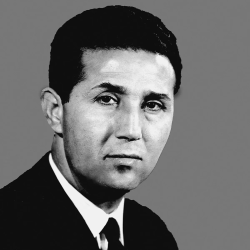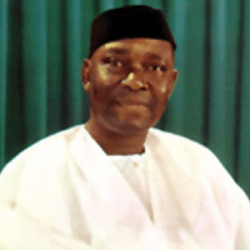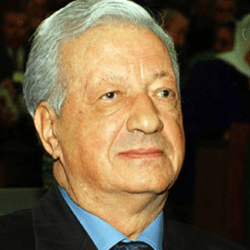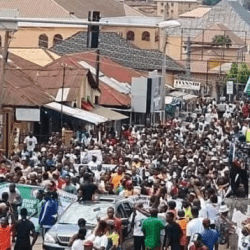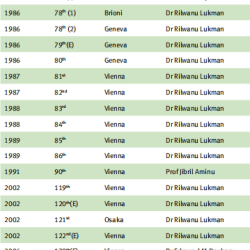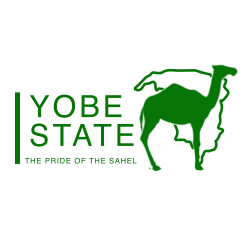Algeria’s Presidents from 1962 to 2019 are:
- Mohamed Ahmed Ben Bella
- Term: September 29, 1962 – June 19, 1965
- First president of independent Algeria. Overthrown by Houari Boumediene in a coup.
- Houari Boumediene
- Term: June 19, 1965 – December 27, 1978
- Ruled as head of the Revolutionary Council, later as president. Known for hydrocarbon nationalization and socialist reforms.
- Rabah Bitat (Acting President)
- Term: December 27, 1978 – February 9, 1979
- Assumed interim presidency after Boumediene’s death until new elections.
- Chadli Bendjedid
- Term: February 9, 1979 – January 11, 1992
- Oversaw economic liberalization and the shift to multi-party politics. Resigned during political turmoil that led to civil war.
- Mohamed Boudiaf (Head of State / High Council of State)
- Term: January 16, 1992 – June 29, 1992
- Assassinated after only six months in office.
- Ali Kafi (Head of State / High Council of State)
- Term: July 2, 1992 – January 30, 1994
- Took over leadership during the early years of the Algerian Civil War.
- Liamine Zeroual
- Term: January 30, 1994 – April 27, 1999
- A general who sought national reconciliation and organized early presidential elections.
- Abdelaziz Bouteflika
- Term: April 27, 1999 – April 2, 2019
- The longest-serving president of Algeria (20 years). Forced to resign following mass protests during the Hirak movement.
- Abdelkader Bensalah (Acting President)
- Term: April 9, 2019 – December 19, 2019
- Served as interim leader after Bouteflika’s resignation until elections were held.
Since gaining independence from France in 1962, Algeria has experienced a diverse and often turbulent political history. The country’s leadership reflects the struggles of nation-building, military influence, democratization efforts, and popular resistance. Here’s an overview of Algeria’s past presidents and their impact on the nation.
1. Mohamed Ahmed Ben Bella (1962 – 1965)
- First president of Algeria after independence.
- Co-founder of the National Liberation Front (FLN).
- Advocated for Arab socialism and agrarian reform.
- Overthrown in a coup led by Houari Boumediene in 1965.
2. Houari Boumediene (1965 – 1978)
- Rose to power through a bloodless coup.
- Known for hydrocarbon nationalization (1971) and state-led industrialization.
- Strengthened Algeria’s role in the Non-Aligned Movement.
- Died in office in 1978.
3. Rabah Bitat (Acting President, 1978 – 1979)
- Took charge after Boumediene’s death.
- Oversaw the transition until elections.
4. Chadli Bendjedid (1979 – 1992)
- Introduced political liberalization and allowed multi-party politics.
- His reforms triggered political unrest, leading to the 1991 crisis and civil war.
- Resigned in 1992 under military pressure.
5. Mohamed Boudiaf (1992)
- A historic FLN leader and member of the revolutionary “Group of 22.”
- Called back from exile to lead Algeria as head of the High Council of State.
- Assassinated after six months in power.
6. Ali Kafi (1992 – 1994)
- Took over as head of state during the early years of the Algerian Civil War.
- His tenure was transitional, focused on stabilizing the country.
7. Liamine Zeroual (1994 – 1999)
- A career general who became president during the civil war.
- Promoted national reconciliation and organized elections.
- Resigned early, paving the way for Bouteflika.
8. Abdelaziz Bouteflika (1999 – 2019)
- The longest-serving president in Algeria’s history.
- Known for the Charter for Peace and National Reconciliation and economic rebuilding.
- Later years marred by corruption scandals and declining health.
- Resigned in 2019 amid mass protests during the Hirak movement.
9. Abdelkader Bensalah (Acting President, 2019)
- Served as interim president after Bouteflika’s resignation.
- Oversaw elections that led to Algeria’s next political phase.
Algeria’s presidential history reflects the nation’s struggles for independence, post-colonial state-building, political crises, and democratic aspirations. From Ben Bella’s revolutionary zeal to Bouteflika’s two-decade rule and eventual ouster, each leader left a distinct mark on the nation’s political landscape.

